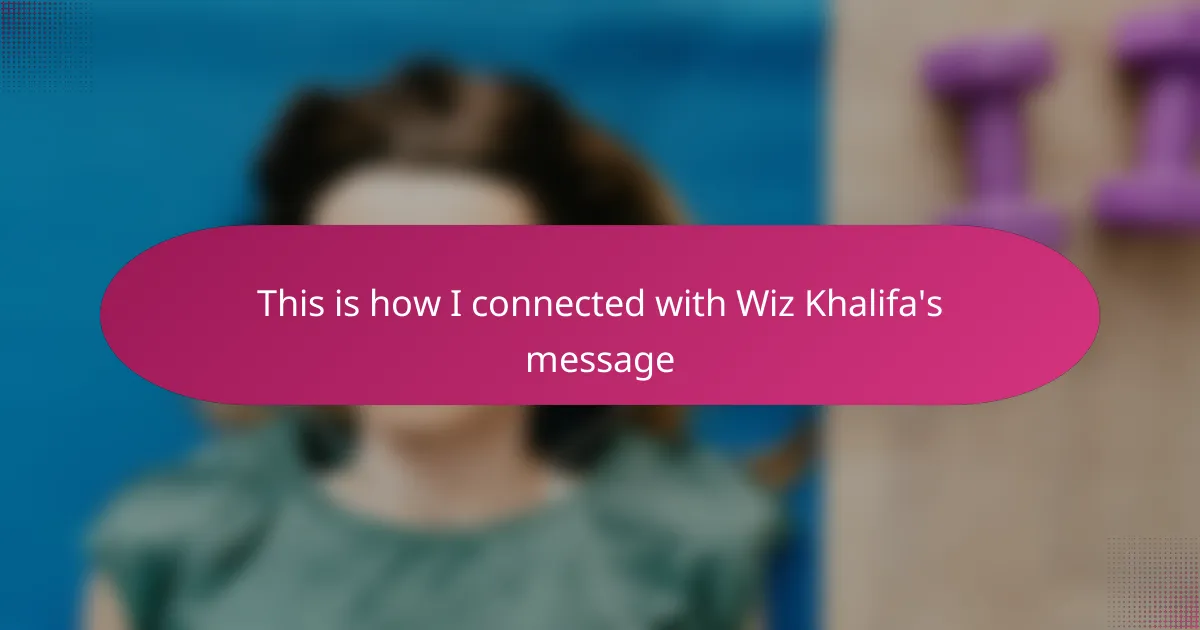Key takeaways
- Rap music serves as a powerful medium for storytelling, expressing personal struggles and community identity through raw emotion and social commentary.
- Wiz Khalifa’s lyrics balance bravado and vulnerability, encouraging self-acceptance and resilience while resonating with listeners on a personal level.
- The themes of freedom, self-expression, and hope in Khalifa’s music inspire listeners to embrace authenticity and face challenges with courage.
- Incorporating rap messages into daily life can lead to greater self-honesty and creative expression, fostering a sense of liberation and connection with one’s true self.
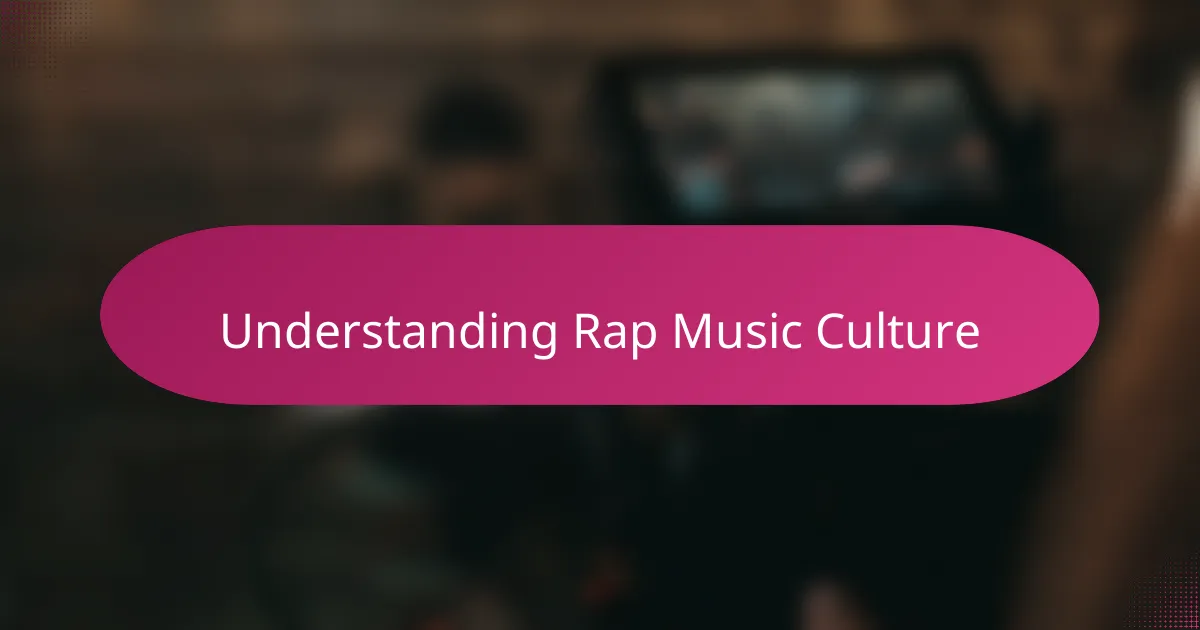
Understanding Rap Music Culture
Rap music culture is more than just beats and rhymes; it’s a powerful form of storytelling rooted in personal struggle and community identity. I remember the first time I really listened to a rap lyric that hit home—it was like the artist was speaking directly to my own experiences, making me feel seen and understood. Have you ever felt that rush of connection when a song just captures what you’re feeling?
What draws me to rap is how it blends raw emotion with sharp social commentary. It challenges listeners to think about issues like inequality, resilience, and hope in ways that are unfiltered and honest. Doesn’t it make you wonder how music can be both a mirror and a megaphone for society?
At its core, rap culture thrives on authenticity and expression. From the turntables to the cyphers on the street, it’s about sharing truth and forging bonds in an ever-changing world. I find that this cultural richness adds layers to each track, making every listen an opportunity to discover something new about life—and myself.
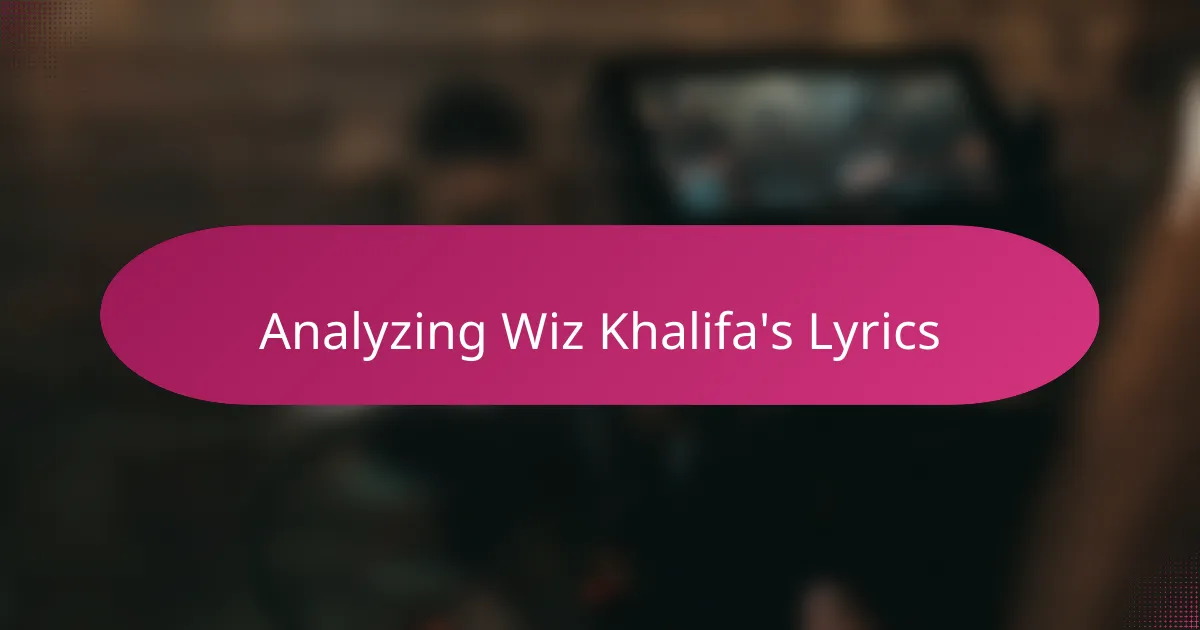
Analyzing Wiz Khalifa’s Lyrics
Wiz Khalifa’s lyrics often resonate because they strike a balance between bravado and vulnerability. When I first paid close attention to his words, I noticed how he doesn’t just rap about success or partying; he also reflects on deeper themes like ambition and self-acceptance. Have you ever caught yourself nodding along because an artist articulated something you hadn’t quite put into words before?
What I find compelling in Wiz’s writing is his straightforward style, which makes his stories feel real and relatable. Lines about chasing dreams or grappling with setbacks feel less like clichés and more like conversations you’d have with a close friend. I think this authenticity is what makes his messages stick with listeners long after the beat drops.
Sometimes, a single lyric from Wiz Khalifa can spark a moment of self-reflection for me. For example, his openness about balancing fame with personal growth reminds me that success doesn’t erase struggles. Doesn’t it make you appreciate how a rapper’s honesty can motivate us to face our own challenges with courage?
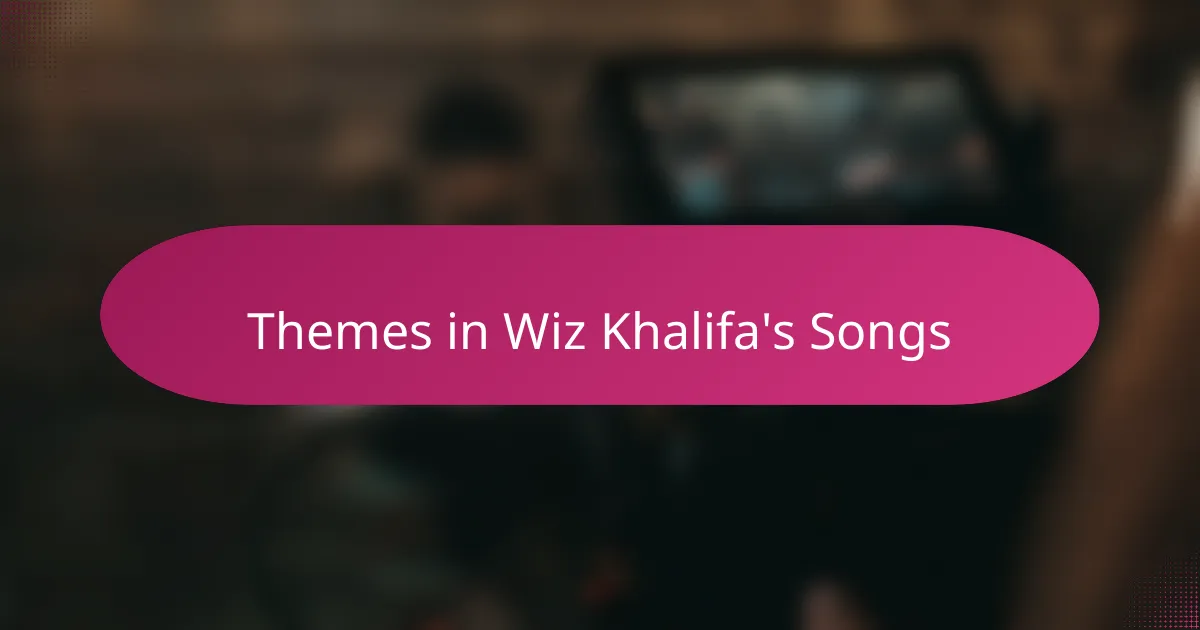
Themes in Wiz Khalifa’s Songs
Wiz Khalifa’s songs often revolve around themes of freedom and self-expression, which feel especially refreshing in today’s music landscape. I remember listening to one of his tracks late at night, and it struck me how he celebrates living life on your own terms, without apology. Don’t you sometimes crave that kind of unapologetic authenticity in the music you listen to?
Another theme that stands out to me is how Wiz explores the idea of escapism, often through vivid imagery related to nature, travel, and yes, even smoking. It’s interesting because while some might dismiss these references as superficial, I see them as metaphors for seeking peace and moments of clarity amid life’s chaos. Have you noticed how these recurring motifs invite listeners to take a breath and reflect?
Lastly, there’s a subtle undercurrent of hope and resilience woven throughout his catalog. Whether he’s talking about overcoming obstacles or celebrating small victories, his words remind me that growth is a journey, not a destination. That message resonates deeply—don’t you think it’s powerful when an artist can inspire both celebration and introspection at the same time?
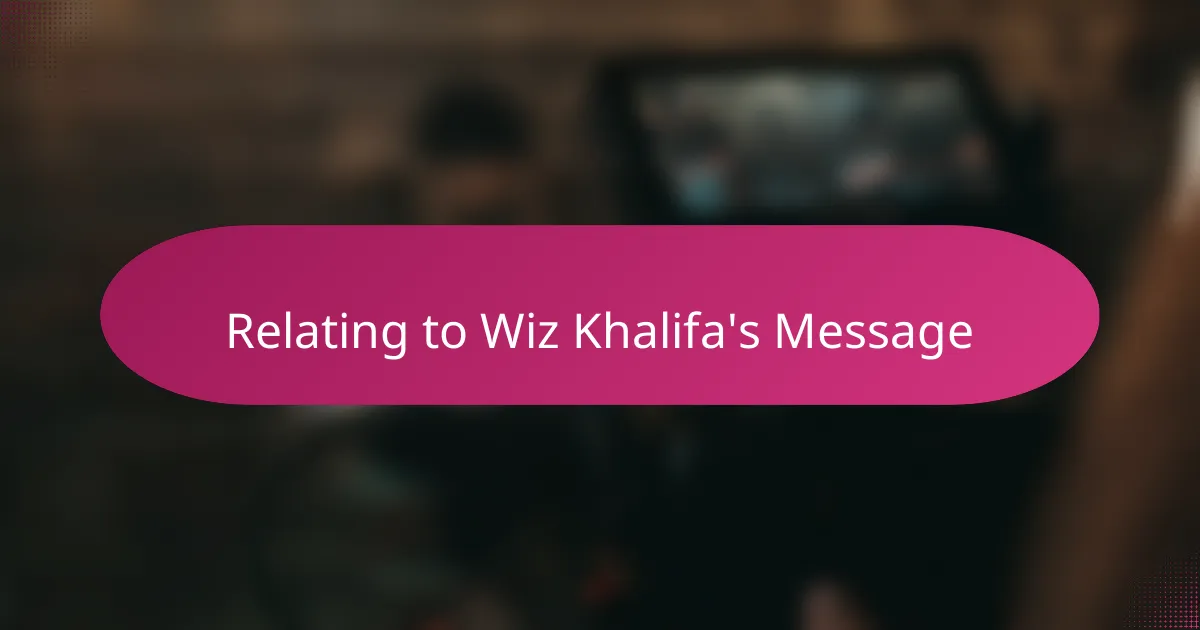
Relating to Wiz Khalifa’s Message
Connecting with Wiz Khalifa’s message felt surprisingly personal to me, especially when I realized how his openness about struggles mirrored moments in my own life. Have you ever listened to a song where the artist’s honesty cuts through the noise and simply makes you feel less alone? That’s exactly what his music did for me.
What really struck a chord was how Wiz doesn’t shy away from vulnerability despite his fame. His willingness to show both confidence and uncertainty made me rethink what strength really looks like. Isn’t it refreshing when someone you look up to shares their imperfect, human side openly?
I also appreciate how his message encourages embracing who you are without apology, even when that means facing judgment or self-doubt. It made me wonder—how often do we hold back parts of ourselves for fear of not fitting in? Through his songs, Wiz challenges us to break free from those limitations, and that’s a powerful call to action I’ve found inspiring.
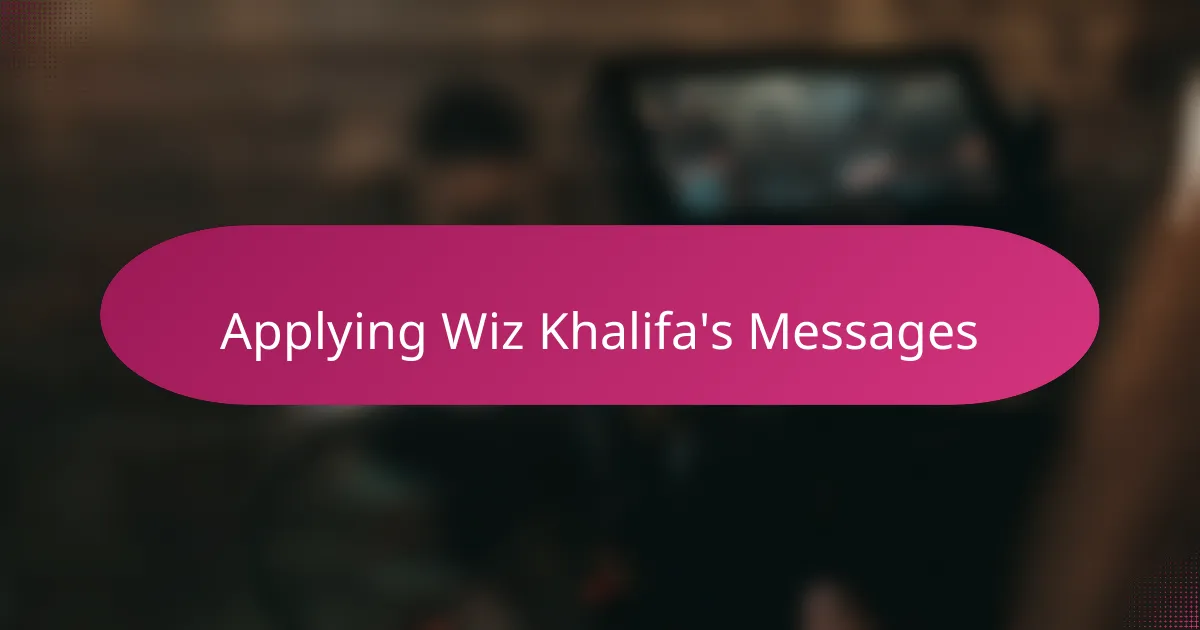
Applying Wiz Khalifa’s Messages
Applying Wiz Khalifa’s messages to my own life didn’t happen overnight. I started noticing how his emphasis on self-acceptance pushed me to be more honest with myself, especially during times when I felt pressured to fit certain molds. Have you ever felt that tension between who you are and who the world expects you to be? For me, Wiz’s music became a reminder to prioritize my own truth.
One practical way I applied his message was by embracing my creative risks without fearing judgment. Wiz talks about living unapologetically, and that encouraged me to take chances in my own artistic projects—even when success wasn’t guaranteed. Isn’t it empowering when art inspires real-life courage like that?
At its core, applying Wiz Khalifa’s message means valuing resilience as much as celebration. When setbacks hit, I recall his honest reflections on growth being a nonstop journey, not just a moment. That mindset helped me stay grounded and keep pushing forward, even when things felt uncertain. Have you found music that does more than entertain—music that fuels your inner strength? For me, that’s exactly what Wiz brings.
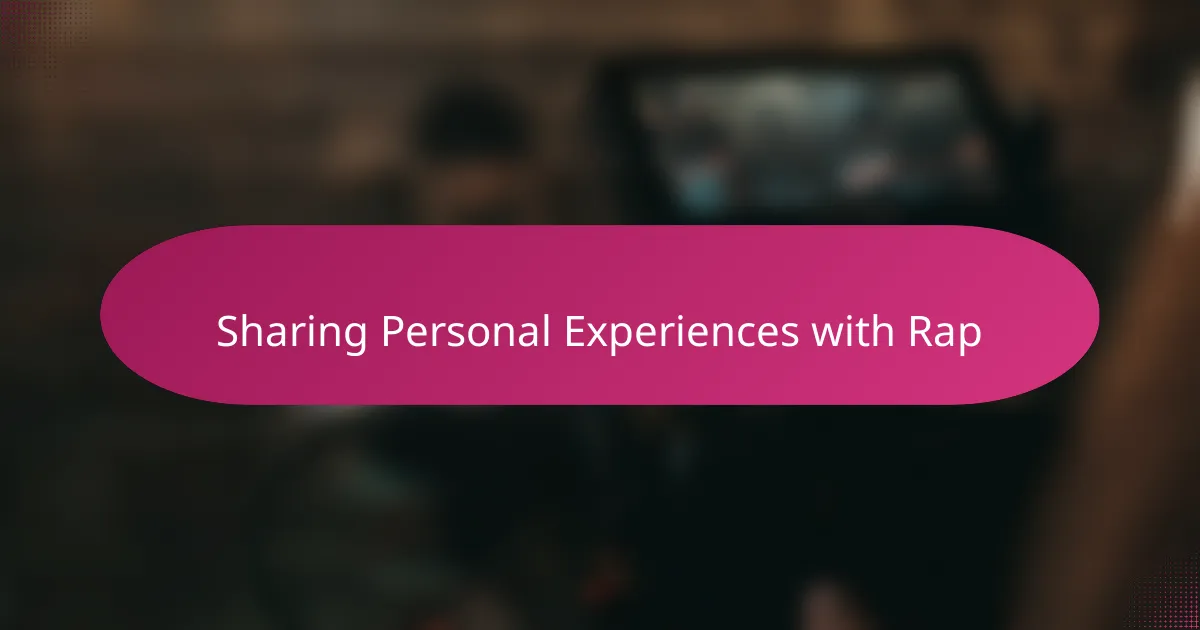
Sharing Personal Experiences with Rap
Rap music has always been a soundtrack to some of the most pivotal moments in my life. I remember late nights when the raw honesty of a verse felt like a lifeline, reminding me I wasn’t alone in facing struggles or doubts. Have you ever had a song that became your personal anthem during tough times?
What I love most about sharing experiences through rap is how it turns personal stories into collective memories. When I hear others express pain, triumph, or hope in their lyrics, it sparks a connection that feels both intimate and universal. Isn’t it incredible how sharing these moments through music can build a sense of community, even among strangers?
Sometimes, I find myself reflecting on my own journey after listening to a poignant rap track. It’s like the artist’s vulnerability opens a door for me to be honest with myself, too. Have you noticed how certain songs invite you to pause and really think about where you’ve been and where you want to go? That’s the power of rap storytelling, in my experience.
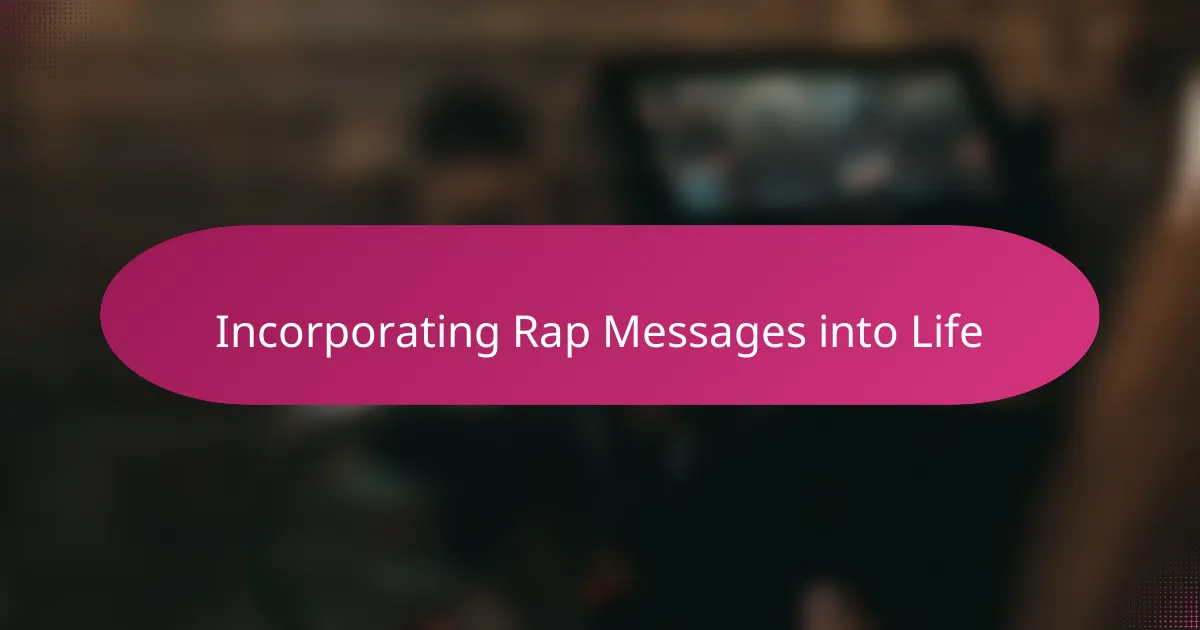
Incorporating Rap Messages into Life
Incorporating rap messages into life often starts with recognizing how those lyrics echo our own thoughts and struggles. I remember how a line from Wiz Khalifa once nudged me to reconsider a tough choice I was avoiding—suddenly, his words weren’t just entertainment; they felt like advice from a trusted friend. Have you ever found yourself replaying a verse because it somehow made your situation clearer?
What really strikes me is how rap isn’t just about catchy hooks but about embracing life’s complexities—joy, pain, ambition—all rolled into one raw narrative. When I let those messages sink in, they remind me to stay authentic, even when the world pushes back or expects me to conform. Don’t you think that’s what makes rap uniquely powerful?
Applying these messages can be as simple as shifting your mindset or as bold as changing how you express yourself daily. I’ve noticed that when I allow myself the freedom Wiz champions, whether in creativity or self-acceptance, I feel less weighed down by others’ opinions. Isn’t that kind of liberation what true connection with music should inspire?
